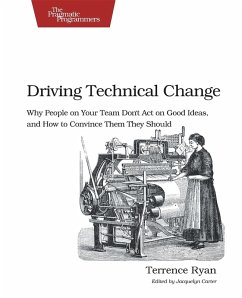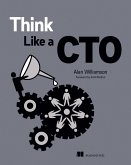Your co-workers' resistance to new technologies can be baffling. Logical arguments can fail. If you don't do politics, you will fail. With _Driving Technical Change_, by Terrence Ryan, you'll learn to read users' "patterns of resistance"-and then dismantle their objections. Every developer must master the art of evangelizing. With these techniques and strategies, you'll help your organization adopt your solutions-without selling your soul to organizational politics.
Finding cool languages, tools, or development techniques is easy-new ones are popping up every day. Convincing co-workers to adopt them is the hard part. The problem is political, and in political fights, logic doesn't win for logic's sake. Hard evidence of a superior solution is not enough. But that reality can be tough for programmers to overcome.
In Driving Technical Change: Why People On Your Team Don't Act on Good Ideas, and How to Convince Them They Should, Adobe software evangelist Terrence Ryan breaks down the patterns and types of resistance technologists face in many organizations.
You'll get a rich understanding of what blocks users from accepting your solutions. From that, you'll get techniques for dismantling their objections-without becoming some kind of technocratic Machiavelli.
In Part I, Ryan clearly defines the problem. Then in Part II, he presents "resistance patterns"-there's a pattern for each type of person resisting your technology, from The Uninformed to The Herd, The Cynic, The Burned, The Time Crunched, The Boss, and The Irrational. In Part III, Ryan shares his battle-tested techniques for overcoming users' objections. These build on expertise, communication, compromise, trust, publicity, and similar factors. In Part IV, Ryan reveals strategies that put it all together-the patterns of resistance and the techniques for winning buy-in. This is the art of organizational politics.
In the end, change is a two-way street: In order to get your co-workers to stretch their technical skills, you'll have to stretch your soft skills. This book will help you make that stretch without compromising your resistance to playing politics. You can overcome resistance-however illogical-in a logical way.
Finding cool languages, tools, or development techniques is easy-new ones are popping up every day. Convincing co-workers to adopt them is the hard part. The problem is political, and in political fights, logic doesn't win for logic's sake. Hard evidence of a superior solution is not enough. But that reality can be tough for programmers to overcome.
In Driving Technical Change: Why People On Your Team Don't Act on Good Ideas, and How to Convince Them They Should, Adobe software evangelist Terrence Ryan breaks down the patterns and types of resistance technologists face in many organizations.
You'll get a rich understanding of what blocks users from accepting your solutions. From that, you'll get techniques for dismantling their objections-without becoming some kind of technocratic Machiavelli.
In Part I, Ryan clearly defines the problem. Then in Part II, he presents "resistance patterns"-there's a pattern for each type of person resisting your technology, from The Uninformed to The Herd, The Cynic, The Burned, The Time Crunched, The Boss, and The Irrational. In Part III, Ryan shares his battle-tested techniques for overcoming users' objections. These build on expertise, communication, compromise, trust, publicity, and similar factors. In Part IV, Ryan reveals strategies that put it all together-the patterns of resistance and the techniques for winning buy-in. This is the art of organizational politics.
In the end, change is a two-way street: In order to get your co-workers to stretch their technical skills, you'll have to stretch your soft skills. This book will help you make that stretch without compromising your resistance to playing politics. You can overcome resistance-however illogical-in a logical way.
Dieser Download kann aus rechtlichen Gründen nur mit Rechnungsadresse in A, D ausgeliefert werden.
"In diesem Buch lernt man eine Reihe Ansätze kennen, mit denen man strukturiert Innovation leisten kann, wie man dabei sein Umfeld einzuschätzen hat und wie man an sich selbst arbeiten muss, damit man mehr Erfolg beim Durchsetzen neuen Ideen jeglicher Art erzielt als bei intuitivem Vorgehen ohne strukturierte Überlegungen. Ein Buch das Klarheit bringt und Dinge ausspricht, die man zwar geahnt hat, aber nicht auf den Punkt bringen konnte." -- IT-Stammtisch Darmstadt, Mai 2011









